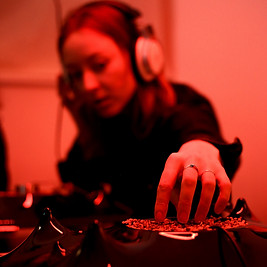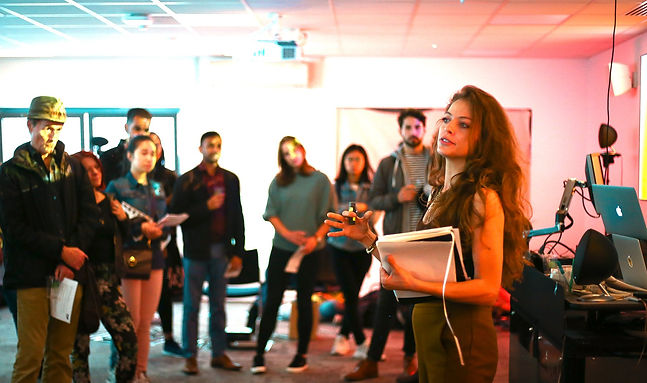
Speculative Immersion
07.06.19
UCL FESTIVAL OF CULTURE | UCL
pAULA Turmina, Deborah Tchoudjinoff, Sofie Mei Birkin, Maya Hope Chaldecott, Charlotte Klein, Cemil Hamazaoglu, Axel drioli, Raffaella Fryer-Moreira, LINDA KLaASSEN, Hermione Spriggs, Grace Boyle + GUESTS
Curated Collectively by the multimedia anthropology lab
This immersive exhibition presents contemporary research on ecological crisis and human futures, in an experimental collaboration by UCL’s Multimedia Anthropology Lab. Over the course of the evening, immersive technologies, visual projections and textured soundscapes will present multiple narratives of the Anthropocene. We will consider the diverse relationships between humans and their environments, and the multiple ways these relationships are understood as they transform. Bringing together interdisciplinary works conducted by anthropologists, artists, and sound designers, this event draws on immersive spatial audio, projection mapping, and VR to take us through the shifting ecologies of our times, while inviting us to speculate on alternative futures.
Multimedia Anthropology in the Anthropocene
The scale of human impact on the biological, geological, and chemical constitution of our planet has led a growing number of scientists to call for a new geological epoch to be named - the Anthropocene, or the age of the human. The anthropocene can be seen as an ecological crisis and as a social crisis - meaning both that ecological destruction will inevitably pose problems from the societies that depend on those ecologies, as well as meaning that the social relationship we have formed with the ecologies we inhabit has become problematic. But it can also be seen as an epistemic crisis - or a crisis in the way we know the world.
The Anthropocene presents a fertile paradox - by asking us to consider the relation between human society and geological phenomena, the anthropocene both assumes the separation between humans and their environments - so as to describe the relationship between them - while at the same time collapsing the division, making one unthinkable without the other. It is both the product and the demise of the “modern” world, making visible the inevitable interconnectedness of human beings as ecosystems and within ecosystems, while also pointing to the conceptual division which got us into trouble in the first place.
Yet, this conceptual division - between “nature” and “culture” , "human" and “world”, permeates deep into Western society, and has structured the very project of scientific enquiry until now. For this division also underpins divisions such as “subject” and “object”, or “representation” and “reality”, or “knower” and “known”. If we are to conduct research in the anthropocene, and attempt to produce knowledge in a way that is “contemporary” - as in, of our times, rather than “modern”, then we must experiment with other methods for conducting and presenting research.
Experimenting with different methods of conducting and producing research is what inspired us to found the UCL Multimedia Anthropology Lab in the first place, encouraging us to interrogate the disciplinary boundaries that have separated art from science, and explore the points of dialogue between our respective forms of thought and practice. At UCL MAL, we have sought to experiment with how the format in which research is presented can be thought and done otherwise - and what we can learn from our colleagues in other disciplines if we consider art, say, as an anthropology thought-otherwise, and vice versa. Today, UCL MAL has grown into a thoroughly interdisciplinary research network, and is committed to radically experimenting with the conceptual possibilities of other material forms - as explored in this exhibition, Speculative Immersion.


Speculative Immersion
Speculative Immersion is an expression of the social relations we are cultivating as a group, and the dialogue between our individual works that are made possible by this interdisciplinary - or transdisciplinary - platform. All contributors were asked to contribute a piece that was research-based and which engaged with the concept of the anthropocene and considered speculative futures, however these parameters were understood. All works were in a very early stage of development - or had not yet been conceived - when this project began, and so have grown organically through a series of meetings, discussions, and dialogue with others in our diverse and interdisciplinary group.
Our imaginations of the future are defined by how we experience and understand our present, and how we narrate our past. Yet the passage of time, and sequence of experience, brings elements that were not previously imagined, behaving in ways previously not thought possible, and resulting in things previously inconceivable. Speculative Immersion seeks to dialogue with the questions posed by the anthropocene - both ecologically, socially, and epistemically, by proposing some other questions of our own. We do not know where these questions will lead us, and if we did, perhaps they wouldn’t be worth asking. In an endeavour towards encountering-otherwise, or other encounters, we explore the possibilities of thought and affect that can emerge, and the doors they may open to worlds, and futures as yet unthinkable.
Gallery


